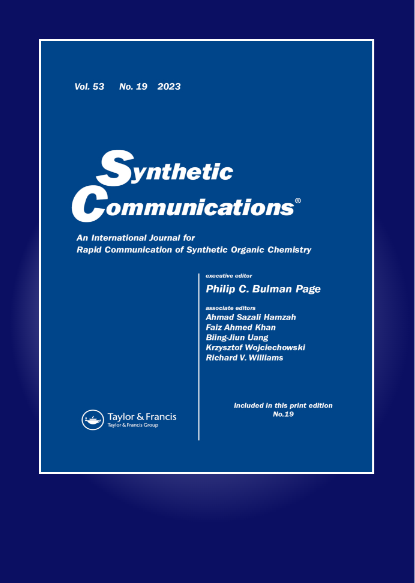Unprecedented one-pot synthesis of 3,4-dihydropyrimidine-2-(1h)-ones catalyzed by hydrazine sulfate through Biginelli reaction, ADMET property, molecular docking studies and their antibacterial activity on Bacillus brevis and E. coli
IF 1.8
3区 化学
Q3 CHEMISTRY, ORGANIC
引用次数: 0
Abstract
The syntheses of 3,4-dihydropyrimidin-2(1H)-ones by one-pot, three-component condensation of aldehydes, β-ketoesters and urea or thiourea have been made more simple and efficient by using 20 mol% hydrazine sulfate as catalyst. Aldehydes, β-ketoesters and urea are cyclocondensed in the presence of hydrazine sulfate to produce dihydropyrimidines in ethanol under reflux conditions. The advantages of using hydrazine sulfate as a catalyst over the traditional Biginelli reaction conditions include outstanding yields (80–91%) and a shorter (10–15 hours) reaction time. In order to evaluate the antibacterial efficiencies of the synthesized compounds, we have studied the inhibitions of microbial proliferation of both Gram-positive (Bacillus brevis) and Gram-negative (E. coli) bacterial strains in comparison to a control group. The microbial inhibitions occur in the range of 40–98% by different derivatives of dihydropyrimidinones. Molecular docking studies of the synthesized compounds have also been done using software tools such as SwissADME.
在硫酸肼催化下通过 Biginelli 反应前所未有地一步合成 3,4-二氢嘧啶-2-(1h)-酮、ADMET 特性、分子对接研究及其对布氏杆菌和大肠杆菌的抗菌活性
使用 20 mol% 的硫酸肼作为催化剂,通过醛、β-酮和脲或硫脲的单锅三组分缩合合成 3,4-二氢嘧啶-2(1H)-酮的方法变得更加简单高效。在回流条件下,醛、β-酮酯和脲在硫酸肼存在下进行环缩合,在乙醇中生成二氢嘧啶。与传统的 Biginelli 反应条件相比,使用硫酸肼作为催化剂的优点包括产率高(80-91%)、反应时间短(10-15 小时)。为了评估合成化合物的抗菌效率,我们研究了与对照组相比,合成化合物对革兰氏阳性(布氏芽孢杆菌)和革兰氏阴性(大肠杆菌)细菌菌株增殖的抑制作用。二氢嘧啶酮的不同衍生物对微生物的抑制率在 40-98% 之间。此外,还使用 SwissADME 等软件工具对合成的化合物进行了分子对接研究。
本文章由计算机程序翻译,如有差异,请以英文原文为准。
求助全文
约1分钟内获得全文
求助全文
来源期刊

Synthetic Communications
化学-有机化学
CiteScore
4.40
自引率
4.80%
发文量
156
审稿时长
4.3 months
期刊介绍:
Synthetic Communications presents communications describing new methods, reagents, and other synthetic work pertaining to organic chemistry with sufficient experimental detail to permit reported reactions to be repeated by a chemist reasonably skilled in the art. In addition, the Journal features short, focused review articles discussing topics within its remit of synthetic organic chemistry.
 求助内容:
求助内容: 应助结果提醒方式:
应助结果提醒方式:


